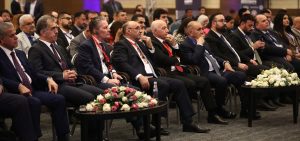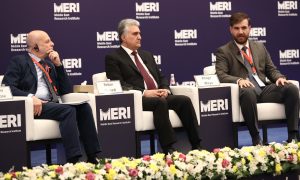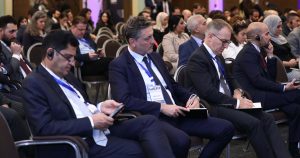Sinjar Agreement: Progress and Barriers
This panel discussion provides an in-depth analysis of the challenges and opportunities surrounding the implementation of the Sinjar Agreement, as discussed by both Mr. Rebar Ahmed, Minister of Interior at the Kurdistan Regional Government (KRG), and Mr. Claudio Cordone, the Deputy Special Representative of the Secretary-General for Iraq for Political Affairs and Electoral Assistance.
- Rebar Ahmed, The KRG Minister of Interior
- Claudio Cordone, Deputy Head of UNAMI
- Khogir Wirya, Research Fellow, MERI (Moderator)
Mr. Ahmed outlined the causes and challenges that led to security gap in the Sinjar region, and the political efforts by both the KRG and Baghdad that paved the way for the Sinjar Agreement (SA). He described the Agreement as “an achievement”…. and its implementation as “a roadmap and a step towards implementation of Article 140 in those disputed areas.
Mr. Ahmed believed that the SA addresses all the problems and issues that are facing Sinjar and provides solutions for them. However, the Agreement has not been implemented by the Iraqi government because, as he put it, lack of political will in Baghdad to implement any agreement with the KRG or the any of the constitutional laws which are related to Kurdistan Region of Iraq (KRI). He then said: “Although there is a good understanding between the KRG and Baghdad, but when it comes to implementation of these agreements and laws, there is another will behind the scenes outside of the will of Government of Iraq, which constitute barriers to these efforts.” Mr. Ahmed stressed that all political factions in Iraq need to unite to push for peaceful dialogue and full implementation of these laws and agreements.
Mr. Rebar Ahmed pointed out that the Sinjar Agreement consists of four main sections, which are administration, security, rebuilding infrastructure and forming a combined committee from KRG and Baghdad representatives to monitor and implement the Agreement. He believed that the fourth section concerning the combined committee is the most crucial part, because it shows that this Agreement is between two governments. He said “Baghdad has not abided by this section and they have unilaterally started to implement some of the parts of the agreement without informing the KRG. This contradicts the Agreement. The KRG cannot be ignored when implementing the Agreement because it is one of the main stakeholders.”

Mr. Rebar Ahmed then pointed to the political actors and armed groups in Sinjar which illegally operate in the region and create barriers for return of the Yezidi families to their areas of origin. He acknowledged that the Iraqi Prime Minister Al-Sudani is determined to end the security gap in Sinjar and implement the Agreement, but the armed groups on the ground are opposing it and do not allow the Agreement to be implemented.
According to the Security aspect of the Agreement, all the armed forces, including the Popular Mobilisation Forces (PMF, Hash Al-Shaabi), the Kurdistan Worker’s Party (PKK) and their affiliated groups, the Peshmerga and the Iraqi Security Forces should evacuate and leave Sinjar. The federal police should replace these forces and control the region. According to the SA, 2500 police from the region will be newly recruited and trained professionally. According to Mr. Ahmed, the security section is a prerequisite for the rebuilding of the houses and infrastructure, because the security situation has to be normalized and all the armed forces have to evacuate in the region.
Mr. Claudia Cordone of UNAMI considered the SA as part of a larger solution to Sinjar’s problem and expressed his appreciation for the commitment of the KRG and the Baghdad government to address this issue. However, he also showed the UNAMI’s awareness of the lack of progress with the SA and that non-state actors are major obstacle which prevent its implementation. He cited a quote from Plasschaert, the Special Representative of the Secretary General of the United Nations, who had previously said: “power competitions in which non-state actors are having, at the moment, the upper hand.”

Mr. Cordone highlighted specific challenges related to the Agreement, including appointing a mayor for Sinjar and establishing a police force to replace armed groups such as PKK and PMF. The lack of progress affects reconstruction efforts, despite funding from Baghdad and international donors. Mr. Cordone emphasized that these challenges, coupled with power struggles and armed groups’ reluctance to withdraw, have a direct impact on the reconstruction efforts outlined in the agreement.
Mr. Cordone expanded the discussion beyond the SA, emphasizing its role as part of a larger solution for Iraq’s other stabilization challenges. According to Cordone, the Agreement’s purpose was to bring stability to the region, and address the need for reparations for Yazidi victims, referencing to Yazidi Survivors law and compensation efforts. He added: “those who have committed genocide ….. need to be brought to justice. This should also be done in a fair way. While he acknowledged that the process is important for all the victims, but it’s also important to avoid putting the collective responsibility on one community, mainly the Sunnis. He stressed: “There were Sunnis who were active in Da’esh. There were Sunnis who had to survive. There were some that actually helped Yezidis to escape and protect them.”
Mr. Cordone addressed concerns about the inclusivity of the Agreement, emphasizing the necessity for dialogue. While acknowledging objections based on a lack of consultation, he urged stakeholders to focus on the substance of the Agreement. He advocated engaging in discussions about specific points within the Agreement to foster a constructive dialogue that addresses concerns and promotes inclusivity.

Security Sector Recruitment in Sinjar:
Regarding the recruitment of 2,500 individuals for the security sector in Sinjar, Mr. Cordone supported the idea of community members comprising the police force. He stressed the importance of adopting transparent selection criteria, including credible vetting processes to ensure the inclusion of individuals with a commitment to human rights and gender diversity. He highlighted the opportunity to provide employment alternatives for young people at risk of joining other groups for economic reasons.
Mr. Cordone acknowledged the importance of creating an environment that encourages returnees, emphasizing comprehensive measures such as reconstruction, livelihood support, and ensuring a normal life for the returning population.
Both speakers then emphasized the need for transparent dialogues, inclusivity, and addressing broader issues in Iraq. They called for the removal of obstacles hindering reparation efforts. The recruitment for the local police is viewed as a positive step, provided it is implemented transparently and inclusively, contributing to the overall goal of stability and reconstruction in the region.
MERI Forum 2023
Addressing Iraq’s Immediate Priorities
10 & 11 October, 2023
Session 13: Sinjar Agreement: Progress and Barriers
Session Video

